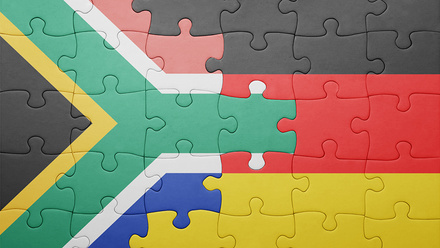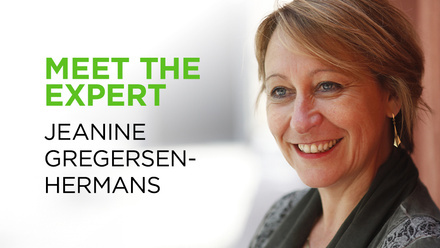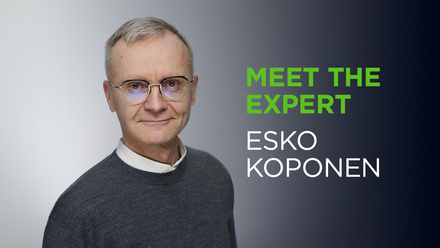Myths and realities about global citizenship

Global citizenship seems to have become a buzzword in the internationalisation of higher education. It is used in all sorts of ways – in promotional texts, in educational goals, in articles on internationalisation – and it seems that the term is open to many interpretations.
I am sure that each of us can easily find examples of what we would describe as a ‘global citizen’. The phrase is not only (mis)used in education, but also in politics: "If you think you are a citizen of the world, you are a citizen of nowhere. You don't understand what the very word ‘citizenship’ means" (Theresa May, October 2016).
After working hours, I play squash at the university sports centre and sometimes I take part in a tournament with students. I once played against Michael, a German student who was studying for his Bachelor's degree in Economics in Tilburg. Although German, he had completed his secondary education in France, went on exchange to Canada and in the summer completed an internship in Togo. His ambition was to do his Master's degree at Yale, and I heard later that he succeeded. Many of our colleagues would consider such a student a global citizen.
I see that this term is used too often and without any explanation in (internationalisation of) higher education. What does global citizenship actually mean, should we use this term in that context, and if so, in what way? And if the term is used, what is actually meant?
Citizenship
My Dutch citizenship gives me the right to reside, vote, express my opinion, associate with others, travel freely within, and enter and exit my country. It does not give me these rights outside of my country; indeed, it does not give me the right to enter any other country. So being a citizen means you belong to a certain country. How do we become a citizen of a country and not of the globe?
We can look at it from a legal point of view: there is difference between the jus soli and the jus sanguine. Law of soil means that where you are born, you acquire the citizenship of that country. There are presidents who want to get rid of this jus soli. Law of blood means that you get the same nationality as your mother and/or father. Of course there are many variations in this across the world.
Many European citizens look for security and identity closer to home: their nation-states, regions or cities
Irrespective of how you receive it, what matters is that with citizenship (national, regional or local), identity plays a very prominent role as well. Also for students who go on an exchange, as they have grown up in a multitude of identities, of the institutions, family, religion, and places where they grew up. Recent elections for the EU parliament show for many European citizens European identity does not exist. In Europe, mainly because of crises resulting from dynamics like migration and climate change, many European citizens look for security and identity closer to home: their nation-states, regions or cities. The European Values Studies, show a clear picture: "But for Europeans, nation comes first, then Europe. Europe has only been accepted in an instrumental and utilitarian way; no emotional or affective attachment exists towards the Union. Europeans perceive themselves first and foremost as French, Italian or Polish. They cherish their language, their habits and national culture.”
Myths
When we look at educational programmes and their learning objectives, we see that some programmes work on the assumption that students can be taught to become global citizens in a course of two credits. I read somewhere, ''We grade an individual reflective paper in which you show... that you are aware of your own place in the world and see yourself as a global citizen, and how you have created positive impact on the lives of others.” Surely it cannot be the case that students can call themselves global citizens?
Assumptions about global citizenship education are usually based on one or more of three myths about global citizenship:
- If a student acquires certain competences during their studies then they become global citizens; global citizenship is something that can be learnt.
- There is a clear and agreed upon definition, vision and consensus of what the term ‘global citizenship’ means.
- There is a clear understanding of what competences and skills need to be learnt to become a global citizen.
However, reality is different.
Realities
What we see in programmes and their learning outcomes is an increased focus on skills and competences. At Tilburg University we developed the Tilburg Educational Profile where we make a distinction between knowledge, skills and character, the last of which can be defined as where students learn critical (self-)reflection, empathic skills, ethics, solidarity, responsibility and personal development. But it is far too much to say, with this built into our education, that "Character for me is to train students to become resilient citizens of the world" (Emile Aarts, Rector Magnificus, Tilburg University, 2019).
The reality is that global citizenship is a very individual concept
The reality is that global citizenship is a very individual concept. It deals with identity and mindset, and it is not static. The context of an Italian student in Bari is very different from the one at the University of Alabama or the one in Uppsala. The local context of the student and the institution should be key. Secondly, teaching about the concept of global citizenship is fluid; it cannot be the same at every institution in every situation in every country. There is not a single textbook explanation possible. And thirdly, what we actually try to do is to enable our students to reflect on “who am I?” and think about their role in society. Whether that role will be global, local, both or in between.
Looking forward
It is very good that we are trying to educate our students so that they feel a sense of social responsibility when they travel the world with a diploma. It is far too pretentious to expect that our education can turn them into global citizens. What we actually mean is that we educate them to become good citizens.
At the closing of the 2017 EAIE Conference in Seville, Taiye Selasi inspired us by saying, “Don't ask where I'm from, ask where I'm local”. Her speech should be part of the discussion on global citizenship, both for our students and for us.
I would like to thank Michael Woolf for inspiring me on this topic. Many of my thoughts and ideas are derived from his writings.






